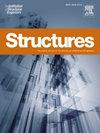Assessment of short and long-term pozzolanic activity of natural pozzolans using machine learning approaches
IF 3.9
2区 工程技术
Q1 ENGINEERING, CIVIL
引用次数: 0
Abstract
This investigation introduces the optimal performance models for predicting the compressive strength (CS) and pozzolanic activity index (PAI) by comparing the machine learning models. The machine learning models, i.e., multilinear regression (MLR), support vector machine (SVM), gaussian process regression (GPR), decision tree (DT), random forest (RF), and gene expression programming (GEP) have been trained (TRN) and tested (TST) by 28 and 7 data points. For the first time, the SiO, AlO, FeO, SiO +AlO +FeO, reactive SiO, Blaine specific surface area, and specific gravity have been used as input variables to compute the CS, and 28 days PAI (28PAI), and 90 days PAI (90PAI) of the natural pozzolans. The multicollinearity analysis showed the SiO, AlO, FeO, SiO +AlO +FeO, reactive SiO, and specific gravity have problematic multicollinearity (variance inflation factor – VIF > 10). Therefore, the root mean square error (RMSE), mean absolute error (MAE), correlation coefficient (R), performance index (PI), and variance accounted for (VAF) metrics have been implemented to evaluate the model's performance and multicollinearity impact. From the comparison of models, it has been recorded that model GPR outperformed the MLR, SVM, DT, RF, and GEP models in predicting CS (PI = 1.29, VAF = 71.31, R = 0.8473, MAE = 0.9390 MPa), 28PAI (PI = 1.87, VAF = 94.88, R = 0.9744, MAE = 0.7295 %), and 90PAI (PI = 1.72, VAF = 88.11, R = 0.9393, MAE = 1.2444 %) in the TST phase, close to ideal values. The score, generalizability. Wilcoxon test, uncertainty analysis, Anderson-daring test, and accuracy metrics have confirmed the superiority of GPR models in predicting CS, 28PAI, and 90PAI of natural pozzolans.利用机器学习方法评估天然胶凝剂的短期和长期胶凝活性
本研究通过比较机器学习模型,介绍了预测抗压强度(CS)和水胶活性指数(PAI)的最佳性能模型。通过 28 个和 7 个数据点对机器学习模型,即多线性回归(MLR)、支持向量机(SVM)、高斯过程回归(GPR)、决策树(DT)、随机森林(RF)和基因表达编程(GEP)进行了训练(TRN)和测试(TST)。首次将 SiO、AlO、FeO、SiO +AlO +FeO、活性 SiO、Blaine 比表面积和比重作为输入变量,计算了天然毛细管的 CS 值、28 天 PAI(28PAI)和 90 天 PAI(90PAI)。多重共线性分析表明,SiO、AlO、FeO、SiO +AlO +FeO、活性 SiO 和比重存在多重共线性问题(方差膨胀因子 - VIF > 10)。因此,采用均方根误差(RMSE)、平均绝对误差(MAE)、相关系数(R)、性能指数(PI)和方差占比(VAF)指标来评估模型的性能和多重共线性的影响。根据模型比较结果,GPR 模型在预测 CS 方面优于 MLR、SVM、DT、RF 和 GEP 模型(PI = 1.29,VAF = 71.31,R = 0.8473,MAE = 0.9390 MPa)、28PAI(PI = 1.87,VAF = 94.88,R = 0.9744,MAE = 0.7295 %)和 90PAI(PI = 1.72,VAF = 88.11,R = 0.9393,MAE = 1.2444 %),接近理想值。得分,可推广性。Wilcoxon 检验、不确定性分析、Anderson-daring 检验和准确度指标证实了 GPR 模型在预测天然胶结物的 CS、28PAI 和 90PAI 方面的优越性。
本文章由计算机程序翻译,如有差异,请以英文原文为准。
求助全文
约1分钟内获得全文
求助全文
来源期刊

Structures
Engineering-Architecture
CiteScore
5.70
自引率
17.10%
发文量
1187
期刊介绍:
Structures aims to publish internationally-leading research across the full breadth of structural engineering. Papers for Structures are particularly welcome in which high-quality research will benefit from wide readership of academics and practitioners such that not only high citation rates but also tangible industrial-related pathways to impact are achieved.
文献相关原料
| 公司名称 | 产品信息 | 采购帮参考价格 |
|---|
 求助内容:
求助内容: 应助结果提醒方式:
应助结果提醒方式:


